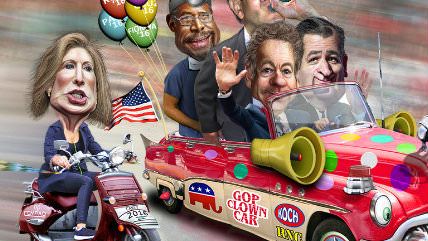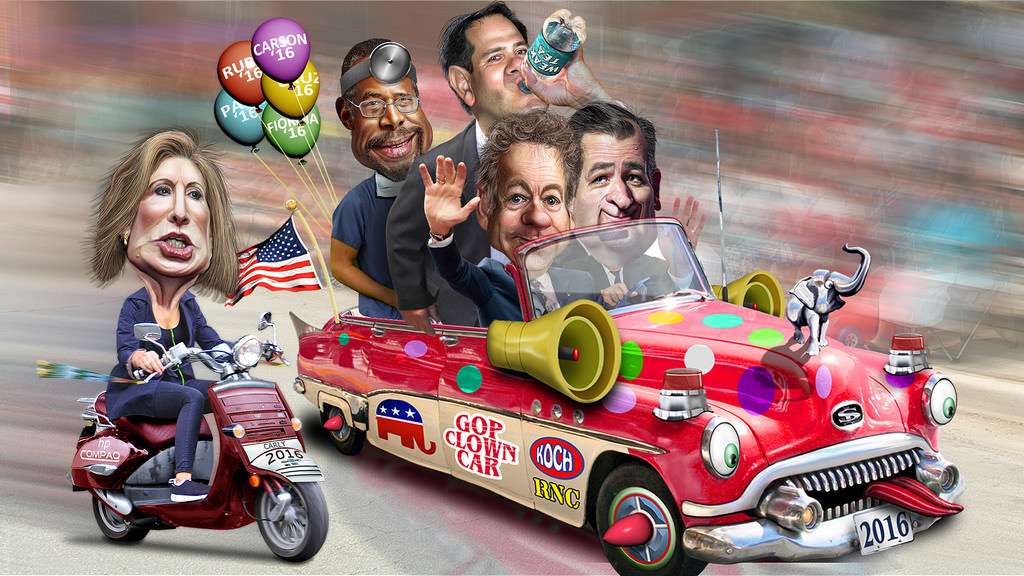Carly Fiorina Takes Rand Paul's Place in Republican Top 10
But Donald Trump continues to dominate the GOP field, with Ben Carson capturing second place.


Donald Trump continues to dominate the 2016 GOP presidential field in terms of mass appeal, earning 28 percent support from Republican and Republican-leaning voters in a new Quinnipiac University National Poll. Coming in second, with 12 percent, is newly top-tier candidate Ben Carson, while Jeb Bush and Sens. Ted Cruz (Texas) and Marco Rubio (Florida) rounded out the top five with 7 percent support each.
Notably, Trump also tops the hell-no list for conservative voters—26 percent say they would "definitely not" vote for him—while Carson has the least definitely-nots of any GOP candidate (5 percent). Meanwhile Kentucky Sen. Rand Paul was anathema to 14 percent of the conservative crowd, despite polling low in the support category (2 percent).
The overall makeup of the Republican top 10 has changed little since the stratified Fox News debate August 6, with one exception. Carly Fiorina—widely agreed to have "won" Fox's junior-varsity presidential debate—has found her way from the also-running crowd to the A-list, while Paul—who received the least talk time of any of the top candidates during the first debate—has slipped to 11th place in this new poll. Fiorina received 5 percent support, as did Ohio Gov. John Kasich.
New Jersey Gov. Chris Christie and Mike Huckabee also fell below Fiorina and Kasich in the new poll. Here are the complete GOP-roster results:
On the Democratic side, Hillary Clinton still leads, with support from 45 percent of Democrat and Democrat-leaning voters—though this is down from 55 percent in July. Vermont Sen. Bernie Sanders now claims 22 percent popularity among liberals, with Vice President Joe Biden close behind him at 18 percent. Clinton's support was markedly higher among women (50 percent versus 38 percent), while Sanders supporters lean more male (29 percent versus 16 percent).
Martin O'Malley and Jim Webb each scored one percent support from Democratic respondents. Eleven percent said they're undecided, which was the same percentage of undecided GOP respondents.
When asked if they had to vote today between Hillary Clinton and Jeb Bush, Clinton came out on top—but just barely—with 42 percent of the vote, compared to Bush's 40 percent. Ten percent said they wouldn't vote.
Clinton fared worst among older adults in this hypothetical hell of an election, with only 39 percent of those 65 and older going for her (compared to 48 percent for Bush). Boomers and Gen X'ers split pretty evently among the two candidates, but millennials were much more likely to go for Clinton (49 percent versus 30 percent). Blacks were also strongly pro-Clinton—only 3 percent of black respondents said they would vote for Bush. Fifty-five percent of Hispanic respondents said they would vote for Clinton, versus 35 percent for Bush.
Clinton also came out on top in hypothetical runs against Trump and Rubio. Biden and Sanders also won in imaginary match-ups against Trump, Rubio, and Bush.

Show Comments (264)